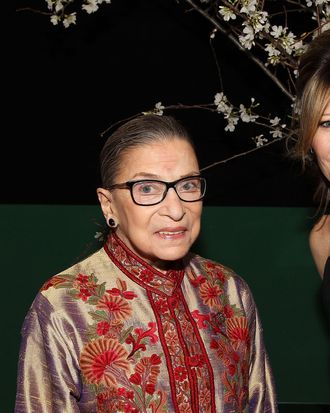
Tuesday night, Supreme Court Justice Ruth Bader Ginsburg received the Roosevelt Freedom Medal for a lifetime spent advocating for the legal equality of all Americans. Ginsburg earned her law degree in an era when women weren’t necessarily welcome in the judicial system. In 1960, Supreme Court Justice Felix Frankfurter rejected her for a clerkship because of her gender, even though she came recommended by a dean at Harvard Law. But she still says she’s glad she was able to train in law during such a dynamic time period.
In a speech last night, she explained, “I counted my great good fortune to have been alive and law-trained in the 1960s and 1970s, when President Roosevelt’s principles were vibrant in our land, inspiring the Civil Rights Movement and the movement of recognition for the equal-citizenship stature of men and women.”
Throughout the ‘60s and ‘70s, Justice Ginsberg worked relentlessly to fight sexual inequality, hearing cases of sexual discrimination referred to her from the American Civil Liberties Union. In 1972, she wrote a brief for the ACLU in the case of Reed v. Reed, resulting in the first extension of the Constitution’s Equal Protection guarantee to women by the United States Supreme Court.
In her speech, she linked those battles to the contemporary fight for LGBTQ rights, invoking President Franklin Roosevelt’s four freedoms (freedom of expression, freedom of worship, freedom from want, and freedom from fear). “More recently those principles have inspired the movement for LGBTQ equality, a movement now progressing at an accelerated pace. May the four freedoms continue to chart our course as we strive constantly to form a more perfect union in the USA.”




